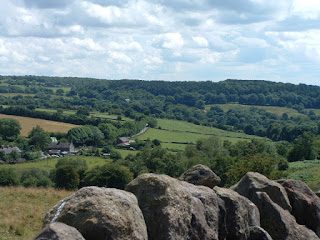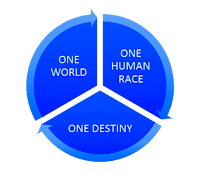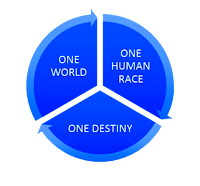THE MEANING OF LIFE CONVERSATION
There I was
with two close friends , having an intense but amicable conversation about many
things, but particularly that about what could be termed ‘the meaning of life’
conversation.
It began with
us considering the comparative merits and demirits of whether a Muslim
organization should be allowed to advertise the refrain “Allahu Akbar” on
British buses, when a Christian organisation had already been refused the
request to have The Lord’s Prayer recited during the interval in Cinemas. Now,
Allahu akbar, as I understand it, means that god is great, and is a saying
which Muslims utter when they are moved to acknowledge his greatness.
The Lords
Prayer, or 23rd Psalms, as I understand it, is the Christian’s
acknowledgement of god’s greatness, and their way of thanking him/her for
meeting their needs and beseeching of him not to lead them into temptation and
deliver them from evil, and so forth. There is, in my view, I informed one of
my friend, no difference between the Christian god and the Muslim god, although
there is a world of difference between the Christian religion and the more
austere orthodox version of Islam.
One of my
friends questioned the fairness of
allowing “Allahu akbar” to be advertised on the buses, when the Lord’s
Prayer was banned from the cinemas. I argued that both were about advertising
religion within public spaces and places, and that neither should be allowed.
My friend argued that allowing TLP to be recited was not the equivalent of
advertising Christianity, and that she did not see why or how it should upset
anybody. While I had some sympathy for her position, I argued that I could find
it annoying, just as how I, not believing in a sentient god, could find an
advert proclaiming ‘god is great’, annoying.
Naturally or
logically, this led us into a conversation of what happens when we die, and a
further exploration of the credibility of Muslim martyrs and jihadists believing
that when they die, they will be rewarded with so many virgins.
The first obstacle
we came across was that of, how, after dying and having our bodies returned
to dust, could we humans be
reconstituted? This, all 3 of us felt, was impossible. One of my friends proffered that, after
death, the ‘Soul’ lives on, alluding to what I have come to characterise as the
‘ergo sumnes’ of humans; the ‘I am, therefore I think’, or, ‘I think, therefore
I am.’
I explained
to her that my take on this enigmatic issue is that, after you die, that is it.
You only exist in the memories of those who knew you or of you. While clearly
finding it difficult to accept that that is really the end of human life, friend
seemed to partly confirm it by noting that nobody has been back from death to
tell us otherwise. During our further exploration of this issue, I posed the
question of what happened to animals after they die and we eat them; do they
not have ‘Souls’ like us? My friend responded by pointing to the fact that
humans have greater intelligence than animals, and are able to manifest our
higher thinking skills more than any animals; resulting in our more advanced
societies.
My friend
acknowledged that some animals are able to ‘think’, even if some of these
skills might be attributed to ‘instinct’ and ‘shaping.’ I interjected by
acknowledging the greater intellectual abilities of humans, and their higher
capacity to modify and develop their habitation and societies, compared to
other animals. I also cited the paradox that, despite these greater capabilities,
it is humans, and not any of the other animals, who has felt the need for a
god.
That’s it?
enquired my friend. If that is it, that there is no life after death, then what
is the purpose of life? I explained that that is a question I and probably everybody
else have, at some point in their lives, asked themselves. She commented on the
terrible lives which many people have had, and how unfair it would be if that
were to be their only lot in this life, and with no other opportunity to have a
better life.
Yes, I rejoined;
life is not fair. It is random and whether you have a good life or a bad life
in this world, is really down to chance. At this point my other friend
commented on the Hindu’s theory about incarnation, and how they hope to have a
better life after each reincarnation.
The purpose
of life, I proposed, it for humans to have as much enjoyment as possible in
this life, and not be satisfied with living ‘hell on earth’, in the hope of a
better life after death, while the elite and the wealth enjoy their ‘heaven on
earth, especially as both the poor and the rich will, in due course, ‘inherit
the earth.’
My friend,
somewhat disappointedly, seemed, at least for now, to have accepted the
hypothesis that that really could be it, that there is no life after death; no
disembodied ‘Souls’ roaming around heaven or on the earth all day for eternity.
Is that such a bad thing, that the fleeting moments which we spend and toil and
enjoy or suffer on the earth, should be the only purpose of our being;
irrespective of our specie? Then am I
reminded of what the Preacher man is reported to have said; that all things are
vanity. Even if we endeavour to dress them up purposefully with our ergo
sumness.
Yes, it
probably is pointless; you might even say, sadistic – if there was any sentient
being in charge of this ‘project or experiment of life – but hay ho, as the
saying goes, we are now prisoners of life and have a duty to make the most of
it while it last.
Make it your
purpose to live your life well and enjoy it to the best of our ability!
OWOHROD








Comments